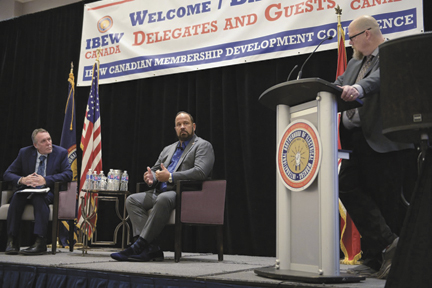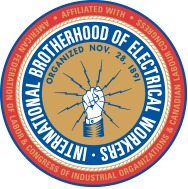Energized by four days full of ideas, information and inspiration in Toronto, an army of First District organizers raced back to their locals in late March, ready to supercharge their efforts to grow the IBEW across Canada.
The Canadian Membership Development Conference, which hadn’t been held since 2019 due to the COVID-19 pandemic, drew 120 delegates, along with dozens of speakers, presenters and guests.
“We need everyone to think outside of the box, get creative, dream big, and seek out opportunities that may be unconventional,” First District International Vice President Russ Shewchuk said, citing the aggressive national organizing plan he launched after taking office last year.
He pledged that officers and staff will support locals every step of the way as organizing in Canada rebounds after years of decline.
“From worst to first!” Shewchuk said, revving up members to outpace U.S. organizing and build ever greater and more diverse bargaining and political power on workers’ behalf. “We have many irons in the fire, and we are on our way there.”
Toward that end, the conference featured a jobsite blitz, a reception with signatory contractors and three days packed with speeches, workshops and more casual yet invaluable opportunities to learn from one another.
“The part I really like is meeting people, exchanging stories,” said organizer Richard Prasad of Kitchener, Ontario, Local 804. “There’s not one book that fits all for us organizers. It’s these stories and the camaraderie that help us become more effective.”
That kind of personal outreach helped journeywoman electrician Chrissie Caprani feel more comfortable in her role as an organizer at Saskatoon, Saskatchewan, Local 529. “I’m learning a lot, especially from seasoned organizers,” she said. “It’s been pretty awesome.”
Shewchuk’s goals for Canada dovetail with International President Kenneth W. Cooper’s mission to grow the IBEW to 1 million members throughout North America over the next five years.
“It’s ambitious,” Cooper acknowledged in his address. “But we didn’t get to where we are today by lowering the bar. I know the last decade here has been tough. But I’m proud to report that you have not only stopped the bleeding, you are growing for the first time in years.
“Momentum is on our side. The construction industry continues to grow across Canada. If we can provide the workers, we get the work,” he said, emphasizing that “the basics of good organizing haven’t changed that much since 1899: It’s about building relationships and trust, one conversation at a time.”
Delegates did exactly that as they fanned out in teams with members of Toronto Local 353 to survey workers at area construction sites and determine which projects are, and aren’t, using union labour.
“We’re collecting data on signatory and non-signatory contractors,” Reggie Latulippe of Ottawa, Ontario, Local 586 said during the survey. “It’s been a good day. So far we’ve hit about six sites and had access everywhere.”
Three days later, the conference welcomed signatory contractors to an “industry night” reception with members.
“It’s a relaxed atmosphere,” said Graeme Aitken, executive director of Ontario’s Electrical Contractor Association. “You learn about each other as people, and when you learn about each other as people it helps you as business partners. And we are without a doubt, as partners, the strongest industry in the construction sector.”
Vancouver, British Columbia, Local 213 Business Manager Jim Lofty said the gathering made it possible “to have a different flavor” of conversation.
“Casual, friendly, open,” he said. “The IBEW Constitution says friendly relationships with contractors, so I think if we’re not doing this, we’re not doing our members a service.”

In his opening-day remarks, Shewchuk shared his excitement about the reception in Canada and the doors it could open.
“We must remember that the enemy is not our signatory employers,” he said. “In fact, they are our allies. Our greatest weapon when it comes to fighting the nonunion and the unorganized. More IBEW contractors under our umbrella equates to better wages and benefits for all.”



